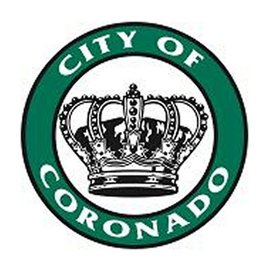 This past summer the Voice of San Diego and The Coronado Times reported on the City of Coronado’s laissez-faire approach to sea-level rise.
This past summer the Voice of San Diego and The Coronado Times reported on the City of Coronado’s laissez-faire approach to sea-level rise.
While other coastal cities (Imperial Beach and Del Mar) have made plans for a future that may well see the ocean rise two feet by the middle of this century and six feet by the end of it, Coronado has taken a more conservative case-by-case approach, adhering to the city’s general plan and California Coastal Commission policy.
This approach changed somewhat at the September 6 city council meeting, when the council took most of the meeting to review and discuss what the city might do to alleviate the sea-level rise that will surely threaten some of the city’s most valuable real estate.
The discussion centered on a presentation by Capt. Ted Camaisa, a retired Navy dentist, and a four year old report on sea level rise in San Diego Bay by the International Council for Local Environmental Initiatives (ICLEI).
The intent of the discussion was to review what steps the city has taken to address the problem and to identify what resources were available to address the problem.
“We are not going to grab this bull by the horns,” Mayor Casey Tanaka said.
While the council didn’t promote any solutions or direct staff to consider any, it did unanimously reactivate the regional sea-level rise working group (that existed around the time the ICLEI report was issued) and peruse the recommendations in that report. It also authorized the staff to prepare a scope of work to seek professional assistance to update and proof the ICLEI report.
“Our plan is to ask that the Port of San Diego take the lead in picking up the ball from the 2012 ICLEI sponsored report and work cooperatively with the staffs of the jurisdictions around the bay to seek joint action,” City Manager Blair King said in an e-mail following the meeting. “The Unified Port of San Diego fits the role nicely of an umbrella organization that can work with the multiple jurisdictions.”
Free Holiday Parking
The council postponed authorizing its annual gift of two hour free parking in the business district. Every holiday season the city gives up its parking revenue to encourage residents and visitors to support local merchants. Not this year — at least not yet.
The new smart meters have complicated the practice. Councilman Mike Woiwode, who pulled the item, worried that covering the meters would decrease parking turnover. Smart meters only allow someone to park for two hours (it is not possible to keep feeding the meter and hold a spot all day long).
Police Chief Jon Froomin said the meters where designed to go into violation after two hours. Though he didn’t explain how the meter would know how long a car had been parked if the meter had not been fed.
Councilman Richard Bailey questioned how the practice of placing a green bag over the meters, which are solar powered, could continue. While each has a backup battery, Froomin wasn’t sure how much storage the batteries had.
Instead of voting, the council tabled the issue until these concerns could be addressed in a staff report.
Bridge Suicide Prevention
The Coronado San Diego Bridge Collaborative for Suicide Prevention has jettisoned the idea of putting a net under the bridge. Instead it wants a fence.
“Caltrans has fences on all their bridges going over freeways to prevent suicides. They do fences; they don’t do nets,” the collaborative’s president Wayne Strickland told the city council. Since Caltrans has jurisdiction over the bridge, Strickland believes the best course is to find a solution the agency is comfortable with.
“We don’t want to waste our time asking for anything else,” Strickland said.




